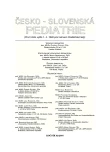-
Medical journals
- Career
Effects of Short-term and Long-term Usage of Cannabinoids
Authors: L. Csémy 1; P. Kabíček 2,3; J. Hamanová 3; P. Hellerová 4
Authors‘ workplace: Psychiatrické centrum, Praha ředitel prof. MUDr. C. Höschl, DrSc. 1; Klinika dětského a dorostového lékařství UK 1. LF a VFN, Praha přednosta doc. MUDr. J. Hoza, CSc. 2; Subkatedra dorostového lékařství IPVZ, Praha ředitel MUDr. A. Malina, Ph. D., MBA 3; Psychiatrická klinika UK 1. LF a VFN, Praha přednosta prof. MUDr. J. Raboch, DrSc. 4
Published in: Čes-slov Pediat 2007; 62 (3): 158-170.
Category: Postgraduate Education
Overview
The paper surveys the knowledge of short-term and long-term usage of cannabinoids (K). Epidemiological studies have confirmed that cannabinoids are the most frequently used illegal psychoactive substances in the developed countries, and the usage among Czech adolescents and young people is considerable (44% all-lifer prevalence, 23% repeated use). Acute effects of cannabinoids on the mind are described in the emotional area (a mild euphoria, feeling of relaxation, but also conditions of anxiety or depression) and in the area of perceptual cognitive functions (deterioration in the tests of attention, short-term memory, verbal learning). In addition to the above mentioned cognitive functions (decreased performance in processing the information, longer reaction times, deterioration of verbal and mathematic skills) the effect of long-term usage also becomes manifest in the area of mental health (a higher occurrence of affective and anxiety disorders in persons dependent on cannabinoids). The ability of cannabinoids to induce psychotic symptoms has been proved repeatedly. The usage of cannabinoids in persons with disposed individuals increases the risk of origin of schizophrenic disease.
In the somatic area, acute intoxication is associated with a series of symptoms, most often excitation, decreased self-control, mydriasis, tachycardia, dysrhythmia, higher temperature and shivering. Intoxication with cannabinoids influenced the activity of circulation apparatus (for example increase heart rate, vasodilatation), the activity of vegetative system (neurovegetative dysbalance) and the function of bronchial muscles. The impact of long-term usage have been documented in the area of respiratory system (increased risk of cancer of respiratory system), animal models indicate a possibility of influencing immune functions caused by cannabinoids. There is no unambiguous conclusion on the impact of cannabinoids on human reproduction, but their mutagenic effects have been confirmed in experiments on animals.
As far as the therapeutic use of cannabinoids is concerned, it has not been proved that certain disease would be cured up. The usage of cannabinoids may mitigate signs of some serious and chronic disease (pain, vomiting, anorexia, muscular rigidity). The usage of psychoactive substances, i.e. also cannabinoids in adolescence is considered as a constituent of the syndrome of risk behaviour, which follows to disorders in this specific developmental period. As far as prevention is concerned, the importance of individually directed primary prevention has been pointed out as well as the role of family physicians, pediatricians and specialist physicians for adolescent individuals.Key words:
cannabinoids, psychological effects, somatic effects, adolescents, prevention, drug abuse
Labels
Neonatology Paediatrics General practitioner for children and adolescents
Article was published inCzech-Slovak Pediatrics

2007 Issue 3-
All articles in this issue
- Socioeconomic Dependence of Traffic Accidents in Children
- The Use of Growth Models for Construction of Velocity Curves of Somatic Characteristics Based on Data of Semilongitudinal Study
- Antiepileptic Drugs and Lactation
- Effect of Toll-like Receptor 4 and Antimicrobial Peptide Cathelicidin on Clinical Course of Infections in Urinary Pathways Caused by Uropathogenic Strains of Escherichia coli
- Effects of Short-term and Long-term Usage of Cannabinoids
- Hereditary Melanoma Resulting from Mutation in the Tumour Suppressor Gene NBS1
- Czech-Slovak Pediatrics
- Journal archive
- Current issue
- Online only
- About the journal
Most read in this issue- Effects of Short-term and Long-term Usage of Cannabinoids
- Antiepileptic Drugs and Lactation
- The Use of Growth Models for Construction of Velocity Curves of Somatic Characteristics Based on Data of Semilongitudinal Study
- Hereditary Melanoma Resulting from Mutation in the Tumour Suppressor Gene NBS1
Login#ADS_BOTTOM_SCRIPTS#Forgotten passwordEnter the email address that you registered with. We will send you instructions on how to set a new password.
- Career

